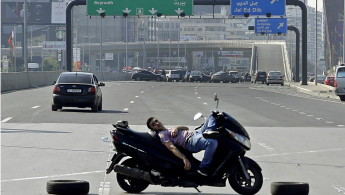In a now almost daily game of cat-and-mouse with riot police, increasingly organised protesters erected temporary road blocks using dumpsters and parked vehicles.
In the capital Beirut, they sat cross-legged on a key flyover and gathered near the Central Bank, which protesters blame for fuelling Lebanon's economic crisis.
Schools had been due to reopen on Monday after weeks of sporadic closures, but some remained shuttered as much of the country remained on partial lockdown for a third Monday.
Unprecedented cross-sectarian demonstrations have gripped Lebanon since 17 October, demanding a complete overhaul of a political system deemed inefficient and corrupt.
The nationwide street movement has brought down the government, in what is regarded as its first major win.
Protesters have, however, vowed to keep up the street movement until all their demands are met, including the formation of a technocratic government.
Yusef Fadel, a demonstrator, ruled out the possibility that the next government could also include party loyalists.
"I reiterate, we are demanding a technocratic government and not a techno-partisan one," said the 25-year-old who holds a masters degree in finance but remains unemployed.
"We need new blood."
Lebanon's president has said the country's next cabinet should include ministers picked on skills, not political affiliation, seemingly endorsing protester demands.
On Sunday, tens of thousands took to the streets, calling for an end to President Michel Aoun's tenure, as well as the removal of a political system dominated by the same figures and families since the end of the civil war.
The mobilisation followed a large rally organised by Aoun supporters in front of the presidential palace.
Follow us on Twitter and Instagram to stay connected





 Follow the Middle East's top stories in English at The New Arab on Google News
Follow the Middle East's top stories in English at The New Arab on Google News
![The UAE is widely suspected of arming the RSF militia [Getty]](/sites/default/files/styles/image_330x185/public/2024-11/GettyImages-472529908.jpg?h=69f2b9d0&itok=Yauw3YTG)
![Netanyahu furiously denounced the ICC [Getty]](/sites/default/files/styles/image_330x185/public/2024-11/GettyImages-2169352575.jpg?h=199d8c1f&itok=-vRiruf5)
![Both Hamas and the Palestinian Authority welcomed the ICC arrest warrants [Getty]](/sites/default/files/styles/image_330x185/public/2024-11/GettyImages-2178351173.jpg?h=199d8c1f&itok=TV858iVg)